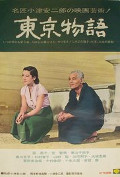
Japan 1953
Directed by
Yasujiro Ozu
136 minutes
Rated G
Reviewed by
Bernard Hemingway

Tokyo Story
Yasujirô Ozu uses the story of an old couple who make the long train trip from their provincial home to Tokyo in order to visit their grown-up children as an opportunity to reflect on the sad realities of life.
Not released in the West until after his death in 1962 it is widely regarded as a masterpiece, not just within Ozu's oeuvre but art cinema in general. That is arguably an overstatement for, although Ozu has a strikingly uniquely poetic style, at times the characteristic “ordinariness” of his principal subject-matter, family life, feels over-indulged in, with the aging parents (Chishu Ryu and Chiyeko Higashiyama) endless smiling almost straight-to-camera in what might be intended as some kind of disarming Zen-like simplicity but that could just as well be a maddening vacuity (and ditto for the widowed daughter-in-law, played by Setsuko Hara). Perhaps times have changed somewhat (the film was made in the shadow of the atomic bomb) and Ozu’s celebration of mundanity feels less charmingly reassuring than it would have been when originally released, at least to a Western audience.
As a kind of document of Japanese culture in transition, something which characterizes many of Ozu's films it is however interesting and the director’s use of low camera angles results in some beguiling compositions that recall Constructivist photography. It is when, however, that Ozu introduces the relatively melodramatic device of a death in the family and the film shifts from indefatigable understatement to near overstatement that the patient (Western) viewer is more able to understand Ozu’s point - all things will pass.
Want something different?





